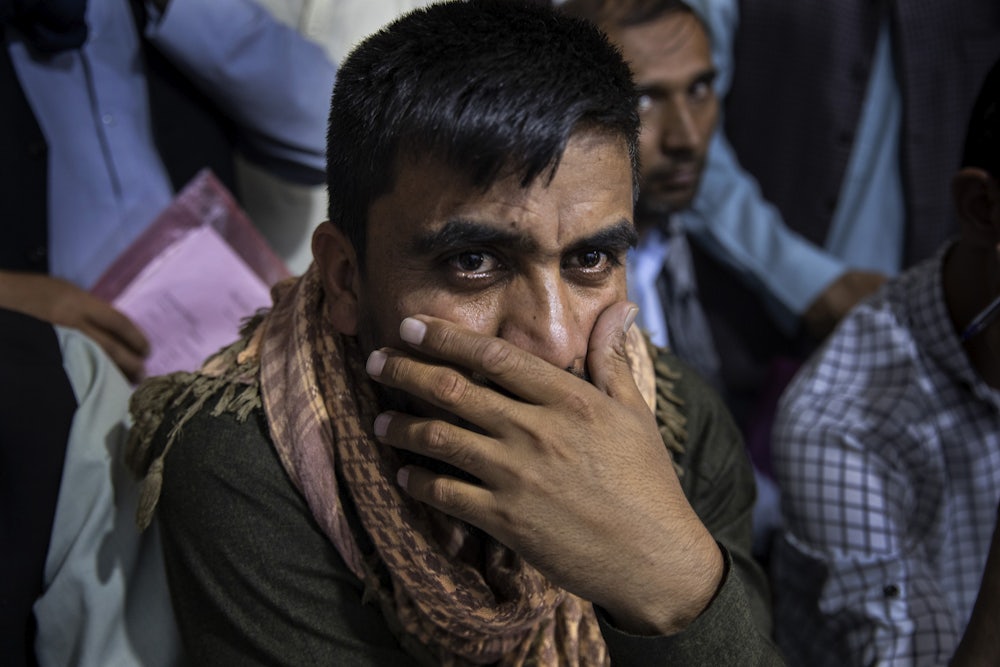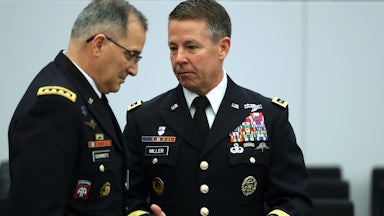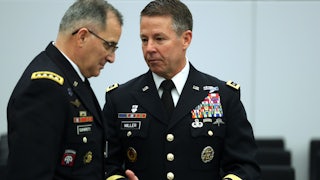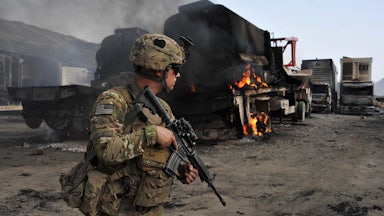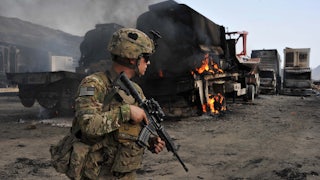The snapshot was taken hastily on a cheap Instamatic camera out the back window of an SUV nearly 20 years ago. But my photo of dozens of joyful Afghan boys racing after an American reporter’s car in the slums of Kabul haunts me more with each passing day.
As I study the tiny faces, I try to imagine what the past two decades have meant in their lives. Despite the regularity of explosions and scattered violence in Kabul, these boys have come of age with a level of security and freedom that was unknown to their parents and grandparents. Did any of them get a full education—and even attend college? Did many of them revel in living ordinary lives free from the heavy hand of the religious police? And, conversely, did a few of them, questing after order instead of liberty, flock to the Taliban?
I make no claims to be an old Afghan hand. As a roving columnist for USA Today, I spent a little more than a week in Kabul in December 2001, during those heady days when the Taliban were routed, presumably forever.
But the memories remain indelible, especially of the women who longed to live in a normal country. I was shown a secret bakery where a group of widows, forbidden to work by the Taliban, supported their families by baking bread. My interpreter—a woman who had defiantly learned English in a United Nations program under the Taliban—was still too frightened to shed her hideous powder-blue burqa on the streets of Kabul. But every time she stepped into a courtyard, she removed the hated headpiece with a hand speed that would dazzle an Olympic athlete.
Barring a military miracle from the demoralized and exhausted Afghan forces, the Taliban may well be back in Kabul on the twentieth anniversary of my brief visit. In recent days, the headlines have brought ominous echoes of the sudden 1975 collapse of South Vietnam, following the withdrawal of most U.S. forces. At least nine provincial capitals have fallen to the resurgent Taliban in the last week. The State Department—with institutional memories of the desperate helicopter evacuation of Saigon in 1975—has been reduced to begging the Taliban to leave the 4,000-person U.S. Embassy in Kabul unmolested if the city falls.
After $1 trillion and 2,312 U.S. military deaths in Afghanistan, Joe Biden appears determined not to be sucked into another face-saving combat mission to stave off the apocalypse. Sadly, another surge, another fantasy about a negotiated settlement, will only delay the inevitable.
In the midst of a pandemic, it is hard to see how a Republican cry of “Who lost Afghanistan?” would have much traction in the 2022 elections. The polls suggest that voters have lost all patience with America’s longest war. A late-July ABC News/Ipsos poll found that 55 percent of Americans support Biden’s decision to withdraw. Tellingly, an April Ipsos poll revealed that only 7 percent of Americans “strongly oppose” the military abandonment of Afghanistan. (Presumably, most members of that militantly opposed 7 percent group are former Bush officials who now haunt the corridors of think tanks such as the Council on Foreign Relations.)
The one unalterable truth of the last six decades is that America cannot create a nation out of humanitarian gestures and upbeat, but duplicitous, pronouncements from Washington. No matter how many schools and hospitals were built, the Vietnamese, the Iraqis, and the Afghans knew that the Americans were short-timers in their country and that eventually they would be rotated home.
There is a stark limit to how much the U.S. military can do outside of combat roles. That was the crux of an argument by a leading political figure in the days before 9/11. As he put it, “I think what we need to do is convince people who live in the lands they live in to build the nations.… Our military is meant to fight and win war. That’s what it’s meant to do. And when it gets overextended, morale drops.”
Irony alert: That adamant critic of nation-building was none other than George W. Bush, in a 2000 debate with Al Gore. As president, Bush fell under the sway of Dick Cheney and Don Rumsfeld—and, well, we all know the rest of the story. But Afghanistan was always a sideshow under Bush, even though the invasion was conducted in conjunction with NATO. At the end of 2001, when I was in Kabul, there were only 2,500 U.S. troops in Afghanistan—most of them fruitlessly searching for Osama bin Laden rather than providing a modicum of security to a war-ravaged nation.
It will be agonizing to watch the dreams of those Afghans who longed to live in the twenty-first century get destroyed by the return of the Taliban. Instead of trying to win the hearts and minds of the Afghan people, it would have been better over the years to find a way to protect those who embrace modernity instead of theocracy. Maybe some form of sanctuary cities could have been achieved, maybe the emphasis should have been on creating a line of defense around Kabul.
All this recalls the half-forgotten 1990s notion of humanitarian intervention. After NATO dithered during the brutal war in Bosnia, and America turned its back on the genocide in Rwanda, there was a growing consensus of “never again” among foreign policy liberals. That doctrine flowered in the late 1990s as the Serbs launched an ethnic cleansing campaign to remove Albanian Muslims from Kosovo. A 78-day NATO air war over Serbia in 1999 culminated in a peace agreement that led to the return of nearly one million exiled Kosovars.
During the air war, I was in Macedonia (now North Macedonia) reporting on the flow of refugees across the border with Kosovo. Serbian buses would arrive filled with homeless Kosovars clutching a few bags of possessions. In my mind, it was a scene reminiscent of the dark days of World War II in Europe.
Perhaps humanitarian intervention was always unworkable outside of Europe. But I wonder how much human suffering could have been averted in Syria if Barack Obama had acted, instead of orating about “red lines” he didn’t enforce, as Bashar Al Assad slaughtered his own people. The resulting Syrian refugee crisis did more to undermine liberal democracy in Europe than any other single event in the twenty-first century. The ferocious debates over welcoming Syrian refugees and the issues surrounding their integration into their new countries triggered the rise of right-wing nativist parties opposed to the very premises of tolerance and even democracy.
Geopolitical altruism is nearly impossible to sustain as a pandemic ravages the globe. As the climate crisis continues to upend the lives of billions of people, these challenges will grow even more daunting. Against that backdrop, the fate of Kabul and the fate of the Afghans who believed America’s promises don’t amount to a hill of beans in this crazy world.
Since the 1940s, “Afghanistanism” has been a synonym for obscurity, a journalistic diversion from infinitely more pressing problems at home. That is why I can only haplessly and hopelessly despair over the fate of Kabul. Time has run out. And so have the Americans, after two decades of ineffectual posturing under four presidents.
